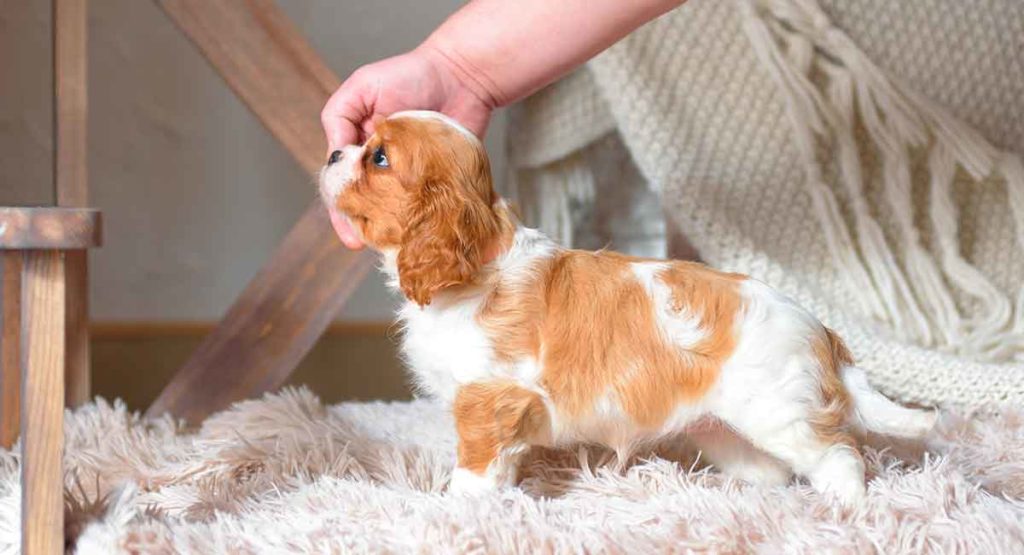Hey there dog enthusiasts! If you've stumbled upon this article, chances are you're already head over heels for the adorable Teacup Cavalier King Charles. These pint-sized pups have been taking the pet world by storm, and it's not hard to see why. With their big soulful eyes, fluffy coats, and charming personalities, they're like little bundles of joy that fit perfectly in your lap. But before you jump into owning one of these tiny treasures, there's a lot you need to know. Stick around as we dive deep into everything about this adorable breed.
Now, let’s get real for a second. While these dogs are undeniably cute, the term "teacup" can sometimes be misleading. It's important to understand what makes a Teacup Cavalier King Charles different from the standard breed. In this guide, we’ll cover everything from their origins to health concerns, grooming tips, and even how to find a reputable breeder. Think of it as your crash course in all things Teacup Cavalier King Charles.
By the time you finish reading this, you’ll have a solid understanding of whether this breed is the right fit for you. So grab a cup of coffee (or tea, fittingly), and let’s get started on this journey together. Trust me, it’s gonna be paw-some!
Read also:Stunna Girl Show The Ultimate Guide To The Phenomenon Taking The World By Storm
Table of Contents
- The Origin of the Teacup Cavalier King Charles
- Biography of the Breed
- Physical Characteristics of the Teacup Cavalier
- Temperament and Personality Traits
- Health Concerns You Need to Know
- Care Tips for Your Tiny Companion
- Nutrition and Diet Recommendations
- Training Your Teacup Cavalier King Charles
- Finding a Reputable Breeder
- Conclusion: Is the Teacup Cavalier Right for You?
The Origin of the Teacup Cavalier King Charles
Let's take a little trip back in time to understand where these adorable fluff balls come from. The Cavalier King Charles Spaniel has roots that trace back to the royal courts of England, dating as far back as the 16th century. They were originally bred as companions for the nobility, providing both warmth and entertainment. Fast forward to today, and we have the Teacup version of this beloved breed.
But here's the thing: the term "teacup" isn't officially recognized by any major kennel clubs. Instead, it’s more of a marketing term used to describe smaller-than-average Cavaliers. These dogs are typically bred to be tinier, but that doesn’t always mean they’re healthier or easier to care for. In fact, their small size can sometimes bring unique challenges.
So, while the Teacup Cavalier King Charles may not have an official title, they’ve certainly earned a special place in the hearts of many dog lovers around the world. Their charm and cuteness are undeniable, but their history is just as fascinating.
Why Are They Called "Teacup"?
Alright, let’s break it down. The "teacup" label is all about size. These dogs are bred to be smaller than the average Cavalier King Charles, often weighing less than 10 pounds. The name itself comes from the idea that they’re so small, they could theoretically fit in a teacup (though we don’t recommend trying that at home).
It’s worth noting that breeding for size can sometimes lead to health issues, which we’ll dive into later. But for now, just know that the term "teacup" is more about aesthetics than anything else. It’s a way to describe a dog that’s extra tiny and extra adorable.
Biography of the Breed
Before we dive deeper into the world of Teacup Cavaliers, let’s take a moment to appreciate their full biography. Here’s a quick snapshot of what makes these dogs so special:
Read also:Charlie Jagow The Rising Star In The World Of Entertainment
Breed Overview
The Cavalier King Charles Spaniel is a small breed of spaniel known for its friendly demeanor and elegant appearance. They’re often described as "gentle and affectionate," making them the perfect companion for families, singles, and seniors alike. When it comes to the Teacup variety, all of these traits are still present, but in a much smaller package.
| Attribute | Details |
|---|---|
| Breed Type | Toy Spaniel |
| Height | 8-12 inches |
| Weight | 5-10 pounds (Teacup) |
| Coat | Long, silky, and soft |
| Colors | Blenheim, Tricolor, Black and Tan, Ruby |
| Lifespan | 9-14 years |
As you can see, these dogs are not only adorable but also incredibly versatile. They come in a variety of colors and have a lifespan that allows for many years of companionship. But what truly sets them apart is their personality, which we’ll explore next.
Physical Characteristics of the Teacup Cavalier
Let’s talk about what makes the Teacup Cavalier King Charles so visually appealing. Their long, flowing coat is one of their most striking features, often described as "silky" and "elegant." This breed comes in four main color variations: Blenheim (chestnut and white), Tricolor (black, white, and tan), Black and Tan, and Ruby (solid red).
But it’s not just their coat that makes them stand out. Their expressive eyes and floppy ears give them an almost human-like quality, making it hard not to fall in love with them. And let’s not forget their compact size, which makes them perfect for apartment living or traveling.
Coat Care
Now, while their coats are undeniably beautiful, they do require some upkeep. Regular grooming is essential to keep their fur shiny and tangle-free. Brushing a few times a week is usually sufficient, but during shedding season, you might need to step it up a notch. And don’t forget about bath time—though these pups don’t need frequent baths, a good scrub every few months will keep them looking their best.
Temperament and Personality Traits
When it comes to personality, the Teacup Cavalier King Charles is a true people-pleaser. They’re known for being friendly, affectionate, and incredibly loyal. Whether you’re lounging on the couch or taking a stroll through the park, these dogs are always up for some quality time with their favorite human.
One thing to keep in mind is that they can be a bit clingy. Because they were originally bred as lap dogs, they thrive on companionship and can develop separation anxiety if left alone for too long. So if you’re someone who spends a lot of time at home, this breed might be a perfect match for you.
Are They Good with Kids?
Absolutely! Teacup Cavaliers are known for their patience and gentle nature, making them great companions for families with children. However, due to their small size, it’s important to supervise interactions to ensure both the dog and the kids are safe and comfortable.
Health Concerns You Need to Know
Now, let’s talk about the not-so-fun stuff: health concerns. While Teacup Cavaliers are generally healthy dogs, their small size can make them more prone to certain issues. One of the biggest concerns is something called Mitral Valve Disease (MVD), a heart condition that affects many Cavaliers as they age.
Other potential health issues include:
- Patellar Luxation (knee problems)
- Ear infections
- Dental issues
Regular vet check-ups and a healthy lifestyle can help mitigate these risks. And remember, choosing a reputable breeder is crucial in ensuring your pup starts life off on the right paw.
Preventive Care
Preventive care is key when it comes to keeping your Teacup Cavalier healthy. This includes a balanced diet, regular exercise, and routine vet visits. Don’t forget about dental hygiene either—brushing your dog’s teeth a few times a week can go a long way in preventing serious health issues down the line.
Care Tips for Your Tiny Companion
So, you’ve decided to bring a Teacup Cavalier King Charles into your life. Congratulations! Now it’s time to make sure you’re prepared to give them the best care possible. Here are a few tips to get you started:
- Exercise: Even though they’re small, these dogs still need daily exercise. A short walk or playtime in the yard is usually enough to keep them happy and healthy.
- Grooming: As we mentioned earlier, regular brushing is essential to keep their coat in top condition. Don’t forget to check their ears and trim their nails regularly too.
- Training: Positive reinforcement is key when training a Teacup Cavalier. They’re smart dogs, but they can also be a bit stubborn at times. Patience and consistency will go a long way.
Remember, every dog is unique, so it’s important to tailor your care routine to fit your pup’s individual needs.
Nutrition and Diet Recommendations
Feeding your Teacup Cavalier the right food is crucial for their overall health and well-being. These little guys have high metabolisms, so they need a diet that’s rich in protein and nutrients. Look for high-quality dog food that’s specifically formulated for small breeds.
And here’s a pro tip: avoid overfeeding. These dogs can be prone to obesity, which can lead to a host of health problems. Stick to portion-controlled meals and avoid giving them too many treats.
Hydration
Don’t forget about water! Make sure your pup always has access to fresh, clean water. Staying hydrated is especially important for small dogs, as they can become dehydrated quickly.
Training Your Teacup Cavalier King Charles
Training a Teacup Cavalier doesn’t have to be a daunting task. In fact, with the right approach, it can be a fun and rewarding experience for both you and your furry friend. Here are a few tips to get you started:
- Start Early: The earlier you start training, the better. Puppies are like little sponges, soaking up everything you teach them.
- Use Positive Reinforcement: Reward-based training is the most effective method for this breed. Treats, praise, and playtime are all great motivators.
- Be Patient: Remember, every dog learns at their own pace. Don’t get discouraged if your pup takes a little longer to catch on.
With a little time and effort, you’ll have a well-behaved Teacup Cavalier in no time.
Finding a Reputable Breeder
Choosing a reputable breeder is one of the most important steps in bringing a Teacup Cavalier King Charles into your life. A good breeder will prioritize the health and well-being of their dogs, ensuring that each pup is raised in a loving environment.
Here are a few things to look for when choosing a breeder:
- Health Testing: Reputable breeders will conduct health tests on their breeding dogs to ensure they’re free from genetic conditions.
- References: Don’t be afraid to ask for references or reviews from past customers.
- Transparency: A good breeder will be open and honest about their breeding practices and will answer any questions you have.
Do your research and trust your gut. Finding the right breeder is key to ensuring you bring home a healthy, happy puppy.
Conclusion: Is the Teac


